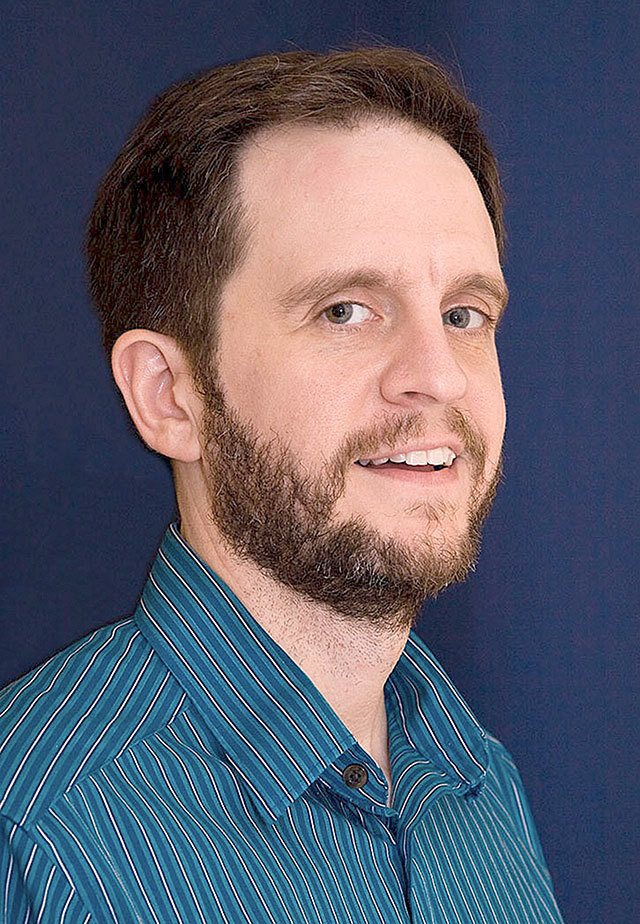EVERETT — Math is where many college students stumble on their way to a degree.
An instructor and researcher with Everett Community College says the type of math taught in basic courses may be part of the problem. Some math stays with students long after they learn it and gets used in day-to-day situations. But the algebra that historically has been taught in college classrooms isn’t that kind of math.
Christopher Quarles, 38, recently completed research focused on two types of math: procedural and conceptual. Procedural math means knowing the steps to solve a specific type of problem, while conceptual math connects equations to practical uses, data or charts and graphs.
Quarles worked with former University of California-Berkeley researcher Mickey Davis on an article published Oct. 18 in Community College Review. They found that conceptual math sticks with students longer than procedural, and that algebra without real-world connections does not prepare students for college math.
Their work is part of a growing collection of research nationally on college instruction. Teachers and administrators are looking for ways to help students finish their degrees.
Less than a third of students who enroll complete a degree or certificate at the community college they first attend. Students often enroll with the intent of transferring to a four-year program. Less than half of those go on to get bachelors degrees, according to Quarles’ research. Students from low-income families have lower college completion rates than their peers. In Snohomish County, about half of students end up paying for remedial math classes in college, which don’t count for credit.
“This has been a big issue for us for a while. It’s a big issue nationally,” Quarles said. “You’ve got millions of students who are taking developmental or remedial classes at community colleges, and basically it’s repeating high school level math.”
So instructors started talking about how to update the program. They couldn’t find much research regarding what math they should be teaching. Quarles decided to do some research of his own.
For the study, students took written tests at the beginning of intermediate algebra and introductory college math classes during two quarters in 2012. Students who hadn’t taken a math class recently forgot many of the steps involved in procedural problems. However, they did well on conceptual problems, which tie math to outside situations and generally have more than one way to find the answer.
“As a teacher, I can say that a lot of it is that these procedural skills come from memorization, so you forget it,” Quarles said. “Humans are very good problem solvers. But for procedural equations, a lot of it is memorization rather than problem solving.”
As colleges talk about how to transform programs, Quarles hopes they focus not only on the way math is taught, but also on the type of math. “Reforms that treat math as a set of steps may not give students the skills they need for their classes, career, and life,” according to the study.
The changes he’d like to see might be hard to make. The advantage of traditional algebra is that students can memorize and drill to get through a class. Tying math to practical problems means students might have a harder time in class but would learn more.
“They need to be struggling, and it has to be just right,” Quarles said. “If it’s too hard, students feel like, ‘I can’t learn this.’ If it’s too easy, they don’t learn. Teaching students to memorize something is a lot easier.”
Quarles hopes other colleges find the research helpful. In his classes, he’s done conceptual math lessons by having students look at the math that goes into buying a house or car. He’s had students calculate how much greenhouse gas is put into the atmosphere by certain cars. In statistics, he’s gone over how students can use math to examine polling data and determine whether a poll is biased.
“If you have the students make those connections in class, they’re more likely to make those connections outside of class,” he said. “It’s not that doing algebra is bad, it’s that it needs to be included as part of a larger package.”
College Spark Washington, a nonprofit that works to help low-income students get degrees, provided funding for the research.
Kari Bray: 425-339-3439; kbray@heraldnet.com.
Talk to us
> Give us your news tips.
> Send us a letter to the editor.
> More Herald contact information.

























